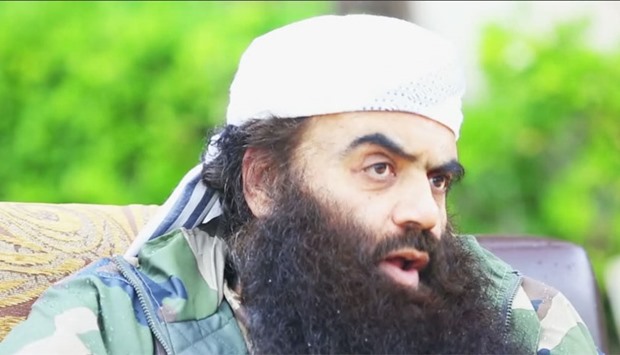Abu Firas al-Suri, whose real name was Radwan Nammous, fought against Soviet forces in Afghanistan where he met Al-Qaeda leader Osama bin Laden and the founding father of global jihad, Abdullah Azzam, before returning to Syria in 2011.
Suri was meeting with other leading Islamist fighters in an Al-Nusra stronghold in Kafar Jales in northwestern Syria when the raids struck on Sunday.
He "was an old time Al-Qaeda member ... He was brought in from Yemen as an ideological counterweight" for rival jihadist group IS, said Pieter Van Ostaeyen, a historian and monitor of jihadist movements.
"His death indeed is a blow for Al-Nusra. However, that will not change a lot on the operational level," he added.
Aymenn Jawad al-Tamimi, a research fellow at the Middle East Forum, a US think-tank, was of the same opinion.
Suri "was a very senior member of Al-Nusra, but organisations like Al-Nusra aren't debilitated because they lose a single senior leader", he said.
"Their organisational structures are well prepared for targeted assassinations, which are usual business for them."
According to the Syrian Observatory for Human Rights, Suri, his son and at least 20 jihadists of Al-Nusra and Jund al-Aqsa and other fighters from Uzbekistan were killed in strikes on positions in Idlib province.
Seven were high-ranking jihadists, the Britain-based Observatory said, adding that the Syrian air force had likely carried out the strikes.
Warning to Al-Nusra?
A temporary ceasefire between government forces and rebels has largely held since February 27, but it does not cover Al-Nusra and IS.
The break has, in fact, allowed Russia and the US-led coalition that has been bombing IS in Syria to concentrate on their fight against the jihadists.
Al-Nusra has generally kept a low profile since the truce brokered by the United States and Russia came into force.
But on Friday, the Al-Qaeda affiliate and allied rebel groups pushed regime loyalists out of Al-Eis, a strategic town in the northern province of Aleppo, killing 12 members of the Lebanese Shiite Hezbollah movement.
"It was Al-Nusra's biggest operation since the ceasefire began," Observatory chief Rami Abdel Rahman said.
Suri's killing may even be a warning by the regime to Al-Nusra against staging any more offensives in future, Abdel Rahman added.
Tamimi disagreed.
"One should not over-interpret the timing," he said, adding that assassinations of members of secretive organisations are usually carried out "when a window of opportunity opens".
IS has also lost a string of high-ranking members in recent weeks, mainly to strikes by the US-led coalition that launched an aerial campaign against the jihadists in Iraq and Syria in 2014.
Last Wednesday, a drone strike near IS's de facto capital Raqa killed Tunisian commander Abu al-Haija, according to the Observatory.
Fifteen IS commanders accused of revealing his position have since been executed by the jihadists, and the fate of another 20 men accused of collaborating with the US-led coalition remains unknown.
"This is the highest number of executions of security officials by IS," said Abdel Rahman, whose Britain-based group has a wide network of contacts on the ground across Syria.
Recapture of Al-Qaryatain
Also on Sunday, the army seized the town of Al-Qaryatain, one of the last IS strongholds in central Syria, according to state television.
IS jihadists withdrew from the town a week after the Russian-backed army and allied militia scored a major victory in the ancient city of Palmyra, which is also located in the vast province of Homs.
The recapture of Al-Qaryatain allows the army to secure its grip over Palmyra, where jihadists destroyed ancient temples during their 10-month rule and executed 280 people.
It has also left IS with just one bastion in Homs province, Sukhna, where the focus of the fighting has now shifted.
Al-Qaryatain is "very important ... because it is located at the intersection of several roads, leading eastwards to Deir Ezzor and Palmyra, and westwards towards Homs and the international highway to Damascus", a general in the town told AFP.
But in spite of the truce, hundreds of thousands of civilians living under siege across Syria remain deprived of essential medical and food assistance, according to Human Rights Watch.
"While aid delivery has improved in the last month, it's still not nearly enough and too many Syrians are still not receiving the aid they need," said Nadim Houry, HRW's deputy Middle East director.

